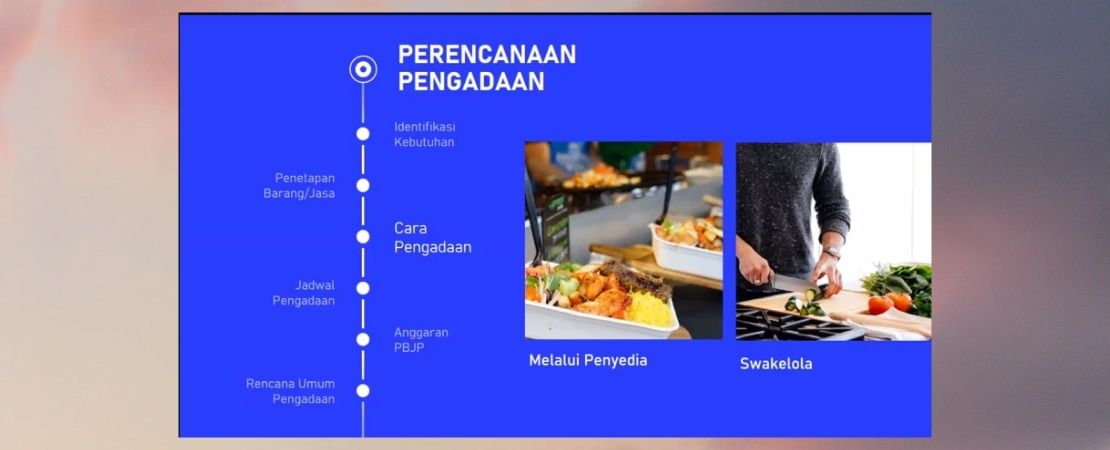Swakelola Tipe III is one of the new mechanisms to support public procurement of goods and services (PBJ) in Indonesia. Under the Presidential Regulation No. 16/2018 concerning Public Procurement, this mechanism has been developed to provide access to community organizations (CSOs) to work together and offer the expertise they have which is needed by the government.
To support the utilization of Swakelola Tipe III, Knowledge Sector Initiative (KSI) in collaboration with INOVASI, KIAT, MAMPU, and PEDULI programs, as well as the National Public Procurement Policy Agency (LKPP) facilitated a consultation meeting on the Implementation of Swakelola Tipe III on 11 August 2020. This meeting aimed to increase the understanding of CSOs and their government partners about Swakelola Tipe III and provided an opportunity to initiate dialogue and explore potential cooperation.
“The interested CSOs must have the working experience, financial records, clear location or valid domicile, which together with other criteria constitute the nine eligibility requirements they need to meet if they want to access Swakelola Tipe III," Ir. Zulhenny, M.Dev Plg, Head of the Sub-directorate for General Procurement Policy Making explained, concerning the requirements and methods of implementation of Swakelola Tipe III.
In this meeting, Nusantara Sejati Foundation (YNS) and the Secretary of the Education Office of Jayapura Regency shared their experiences in utilizing Swakelola Tipe III. YNS implemented an early grade literacy program, which included teacher training, intensive mentoring, and learning evaluation to improve reading and writing proficiency in remote schools in Jayapura Regency.
"(Swakelola Tipe III Mechanism) is much more effective and efficient; it also increases the human resources capacity. YNS felt motivated to come up with innovations in the field of education to improve the quality of education in Jayapura Regency. " said Eva Hutauruk from YNS.
Jayapura District Education Office had replicated the literacy program three times and Central Mamberamo Regency had also done the same thing, while Mamberamo Raya District Education Office was currently planning to do this in 2021. “We decided to adopt the literacy program because we believe in the success of our YNS friends," said Suprojo D.S, S.Pd, MA, M.Pd, Secretary of the Jayapura Regency Education Office.
Later in the meeting, potentials of Swakelola Tipe III mechanism were further discussed and elaborated in group discussions which involved representatives of all contributing programs, program partner organizations, and the government partners of the participating CSOs. Each group discussed activities that were feasible to be carried out using the Swakelola Tipe III scheme, as well as ways to realize them, and identified the support needed to materialize the plans.
From INOVASI program, CIS Timor and the Indonesian Children's Literacy Foundation (YLAI) were present at the meeting, and they brought along representatives from Kupang District Disaster Management Agency (BPBD) and the Education Office of East Sumba District, West Sumba Regency, and Southwest Sumba Regency. Meanwhile, from the KIAT program, Penabulu Foundation and PATTIRO attended, bringing along the South Sumatra Provincial Planning Office (Bappeda), Pagar Alam City Development Planning Agency, the Deputy for Gender Equality at the Ministry of Women's Empowerment and Child Protection (KemenPPPA) and Semarang City Health Office.
MAMPU program presented Sado Ahmo Association (Pesada) and Flower Aceh, which brought along the Dairi District Health Office, Women's Empowerment, Child Protection, Population Control and Family Planning (P3AP2KB) Office of West Nias Regency, as well as Bappeda, and P3AP2KB Office of Banda Aceh City. Meanwhile, SAMIN Foundation and Satunama Foundation were present on behalf of PEDULI Program, and they brought along the Women Empowerment, Child Protection and Population Control Services (P3AP2) Office of Yogyakarta Province and Sleman Regency, Bappeda of South Tanimbar Regency, and the Trade and Cooperatives, SMEs, Trade and Industry Office of Merangin District.
When results of the discussion for each group were reported, Riswati from Flower Aceh, a partner of MAMPU, expressed her inclination to seize this opportunity which would allow CSOs and NGOs to participate in Regional Public Procurement processes. "The communication materials developed by KSI are very helpful to serve as a basis for strengthening relations with government partners in the regions," added Riswati.
The broad scope of Swakelola Tipe III, starting from community assistance to carrying out analysis, studies or research for policy-making processes, opens up opportunities for CSOs to be involved in achieving the goals set by the government. By exploring these potentials, it is hoped that an initiative will be established to plan a collaboration using Swakelola Tipe III. KSI encourages the use of Swakelola Tipe III in order to support policy makers in Indonesia to develop policies informed by better research results, data and analysis.






